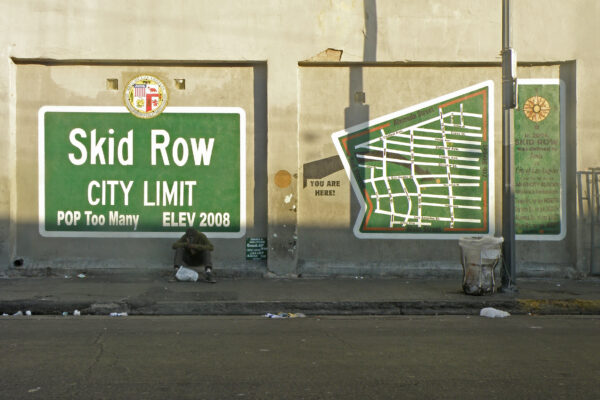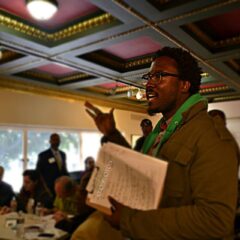This post also appeared on Equal Voice News and Huffington Post.
A state of emergency signals that a catastrophe, social or natural, has challenged or upended civic order. Under states of emergency, normal state functions are often suspended in response to extraordinary circumstances.
The L.A. City Council declared a state of emergency over homelessness in Los Angeles last fall. Though Mayor Eric Garcetti declined to affirm that declaration, his proposed budget, released this week, increases spending on homeless programs by $100 million next year.
But from the vantage of Skid Row—where I work as a chaplain and advocate in the epicenter of the homelessness crisis in L.A.—it’s clear that our circumstances are not extraordinary. Simply put, we have constructed this state of emergency through neglect and poor policy-making.
As such, the solution to homelessness must go beyond declarations or budgets; it requires a shift in the values that shape our policies. People of faith play an essential role as prophetic voices in that work.
The lack of a forward-thinking approaches to homelessness has created an opening for those who advocate neoliberal housing and policing policies, which both depend on and reinforce a reactive attitude toward homelessness. Specifically, we incentivize the aggressive policing and containment of homelessness when it infringes on “urban renewal” in the form of high-cost housing developments.
The neoliberal economic and political ideology prizes deregulated free markets and individual wealth, the reduction or elimination of taxes, and the accumulation of private property above all else, while remaining staunchly resistant to any kind of governmental infringements on entrepreneurial freedoms. In Los Angeles, prioritizing the interests of those who already have much hinders our ability to address the needs of those who have almost nothing at all.
Since 2008, state and federal funding of affordable housing in California has been eviscerated. Annual investment has gone from $2.6 billion to $807 million, a staggering 69 percent reduction. In Los Angeles we spend a mere $26 million on affordable housing, compared to the $108 million we spent before 2008.
Meanwhile, since 2000, rent has risen 22 percent, while the median income has dropped 8 percent. Even if the city manages to raise money for homeless programs, little trickles down to the least fortunate, save the daily difficulties of life.
In this city, homelessness is seen primarily as a problem needing containment. Skid Row exists because of our collective inclination to avert our eyes—to demarcate a space where undesirable bodies might be gathered. This process has only intensified as the booming areas surrounding Skid Row continue to gentrify.
We task our police with keeping these undesirable bodies contained. We fine the homeless for minor crimes like jaywalking and littering, following the neoliberal “broken windows” policing strategy in hopes of deterring major crimes. Yet more often, unpaid fines turn into warrants, which lead to incarceration and the loss of access to support services. It’s a strategy of disempowerment by dispossession.
Now, officers can disband homeless encampments, which are up 85 percent over the last four years. Homeless individuals are allowed to keep 60 gallons of possessions on the street—about the size of a large recycling bin. Property seizures push the dispossessed to a designated location to retrieve their belongings—a site likely to be on Skid Row.
Law enforcement officers are not the problem. We work with some truly caring and concerned police in this community. The problem is the values that create the policy that officers must then enforce. The LAPD spent as much as $87 million in one year for containment and enforcement, allowing us to avert our eyes from homelessness.
Some argue that pushing homeless people to Skid Row allows them to receive resources that are not available elsewhere. Indeed, people of all faiths and none come to Skid Row to serve the homeless. But the channeling of the dispossessed into Skid Row is “not-in-my-backyard” (NIMBY-ism) writ large, and writ legislatively. Surely, herding people into a space already overflowing with homelessness and poisoned with street violence and drug use is not an optimal plan for those in need.
The city and county’s plan to create more housing is a great start. Yet housing, too, can simply mean putting the disenfranchised behind closed doors and out of view.
Prophets in all faith traditions call the community back to radical hospitality and provision for those churned out by the social system.
Today, radical hospitality means welcoming and serving people in every neighborhood in Los Angeles. It means fighting for policies that allow the homeless feel safe wherever they are.
As housing programs develop over the next decade, we must embrace and provide opportunities to the newly housed. We must counter the systemic structures that under gird not only the homelessness epidemic but also poverty in general.
In order to avoid simply remaking our “neoliberal bed,” we will need to remake our values as we replenish the housing stock. If people of faith are willing to risk and speak out as prophets—prophets with social service know-how—they might be able to contribute to the construction of a more livable world, a world not as hard as the otherwise austere neoliberal bed.
Photo Credit: Laurie Avocado / Flickr
Jonnie Russell is a contributing fellow with the USC Center for Religion and Civic Culture.





